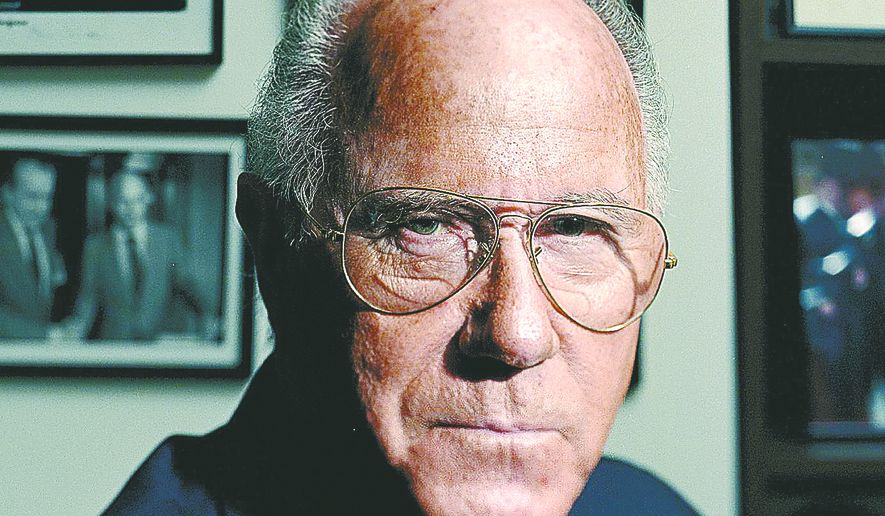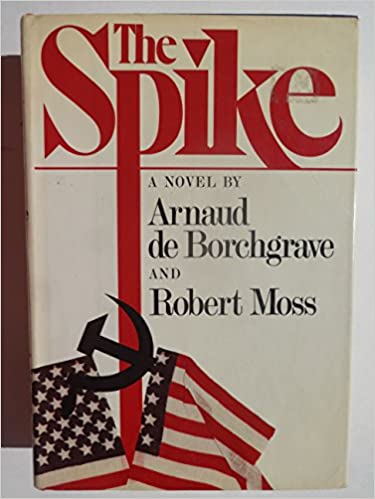Special to WorldTribune.com
‘The Spike’, the bestseller spy novel by Arnaud de Borchgrave was published in 1980.
By Robert Morton, Oct. 23, 1980

WASHINGTON — Would anyone be interested in reading a non-fiction report about how the “Disinformation” directorate of the Soviet KGB influences America’s media, top government officials and even White House policy using a network of radical U.S. think tanks?
Arnaud de Borchgrave and Robert Moss wisely decided that no, a straight article or book on the subject would be neither widely received nor believed. Instead, they produced a novel, “The Spike,” that has remained on the best-seller lists and has sold 158,000 copies in hardback since being published by Crown this spring.
Peter Baestrup’s “brilliant retrospective on the Vietnam War coverage . . . was read by 10,000 people in this country. I doubt even that,” explained de Borchgrave in a telephone interview. “But we decided from the very beginning to do it as a political thriller, to use that as a vehicle to inform on a very little know but tremendously important aspect of Soviet intelligence operations — particularly those directed against the Western media — which is one of the five principal directorates of the KGB.”

[Related: Arnaud de Borchgrave, 88, legendary correspondent and editor, Feb. 15]
“The Spike” is a story of a crusading journalist working for the New York World (the New York Times) whose sympathies on controversial issues such as the CIA lie with a number of radical friends at the Institute for Progressive Reform (the Institute for Policy Studies) in Washington. But he undergoes a conversion experience of sorts after having lunch with the CIA’s Counter-Intelligence chief, Nick flower (James Angleton), who informs the reporter that one of his closest friends works for the Soviet KGB.
The obvious parallels between principal characters in “The Spike” and key figures in Washington including Vice President Walter Mondale, National Security Adviser Zbigniew Brzesinski, his deputy David L. Aaron and former Senate Intelligence Committee Chairman Frank Church, has understandably given the book considerable impact in the capitol city.
The book also focused attention on the Institute for Policy Studies (IPS), the radical character of which has consistently been played down by such publications as the New York times, which has described it as one of the three major private policy institutions in Washington (in the same class as the Brookings Institute and the American Enterprise Institute.
When analysts from the IPS or one of its bewildering network of like-minded relatives write for mass consumption, their organization is typically described as an “independent research organization.”
But in a devastating article appearing in Midstream, Dr. Rael Jean Isaac charged that the “IPS can fairly be described as an enormous intelligence operation practicing both covert action and subversion.”
“It is itself an adaptation of the multinational corporation, and serves as an ‘imperial’ nerve center, with endlessly subsidiary operations that in turn influence and shape a whole series of ostensibly independent groups,” she wrote.
Saul Landau, a fellow at IPS, and administrative assistant Ann Wilcox, denied in interviews that the organizations that have been founded or funded by the IPS or that have interlocking directorates are associated directly. Landau vehemently countered allegations that the IPS and its affiliates oppose the CIA and a selective human rights policy that criticizes only antic-communist and traditionally pro-western nations.
“Those allegations are made by kooks and fascists,” he charged.
Denying U.S. Values
But the writings of members of the interconnecting network of organizations betray a consistent denial of American values and opposition to American foreign policy stances, according to Isaac and other critics.
For example, Fred Halliday — a fellow of the IPS-sponsored Transnational Institute — had written favorably about the Soviet-backed regime of Afghanistan before the invasion, and afterwards suggested in an article for the New York Times that the United States should not provide aid for those resisting the Soviet occupation, and in other ways seek to turn the clock back in Afghanistan.
Founded in 1963 by Richard Barnet and Marcus Raskin, the IPS quickly attracted a clutch of former activists in the Students for a Democratic Society, (SDS). Since it has grown, helped by financial grants from such ideologically sympathetic trusts as the Samuel Rubin family and the Rabinowitz Foundation — both of New York.
Rubin’s daughter, Cora Weiss, and her husband, Peter, joined Barnet and Raskin in the anti-Vietnam War effort and traveled to North Vietnam to support the communist offensive. Following the U.S. withdrawal from South Vietnam, the policies of the IPS and its myriad offshoots gained credibility, and Barnet and his colleagues began to affect more subtle tones in their writings.
Network Makes U.S. Policy
Meanwhile, key figures in the IPS network worked their way into important policy positions within the Carter Administration. These included David Aaron, Robert Pastor, Rick Inderfurth and Gregory Treverton in the National Security Council, all of whom have served as consultants for the Center for International Policy. The C.I.P. is supported by grants from the Fund for Peace — a frequent donor to leftist causes.
From their positions in the National Security Council, they have collaborated with other network members in the State Department, including Policy Planning Staff director Anthony Lake. Aaron was given the responsibility to sell SALT II to the Senate. Later, in January 1979, Carter chose him to head a task force to investigate why the U.S. intelligence agencies had failed to predict the Iranian crisis which toppled the shah from power.

You must be logged in to post a comment Login